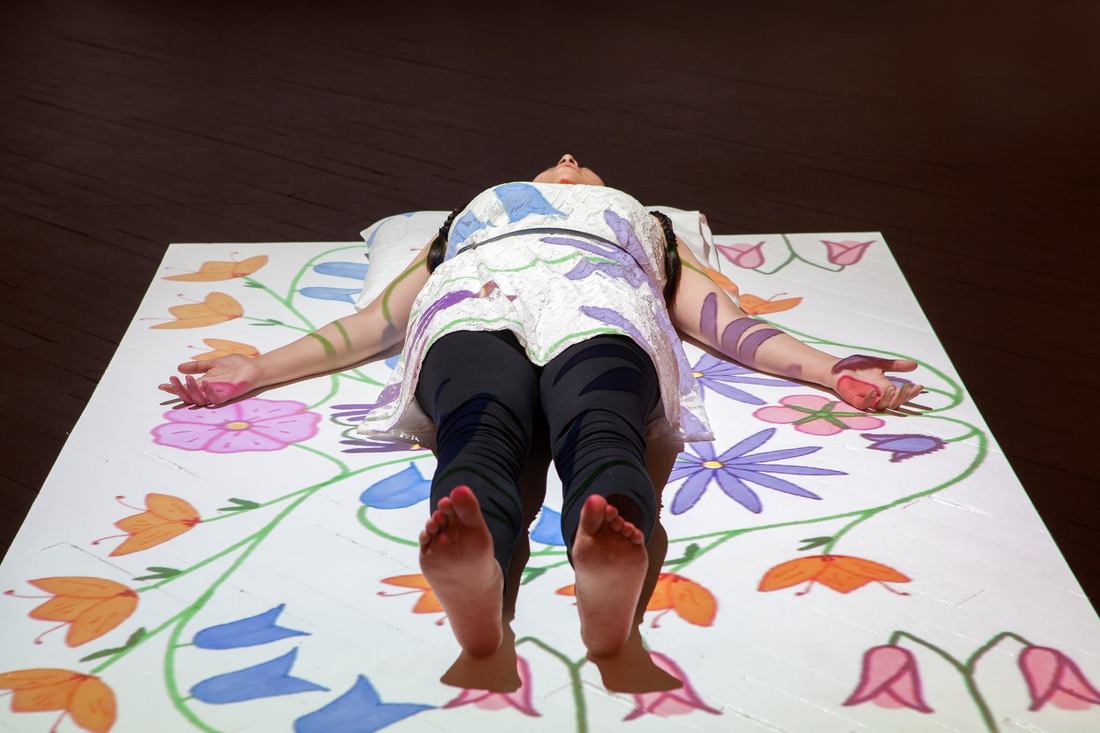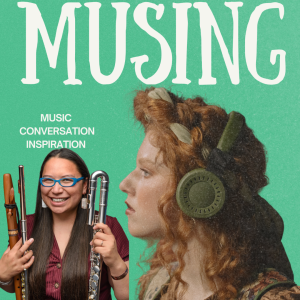CMC Prairie Region director Janna Sailor and V. Jessica Sparvier-Wells (Jessica McMann) sat down to discuss her award winning album Prairie Dusk, upcoming tour dates, reclaiming her birth name, and more!
Creating Prairie Dusk: The Journey
Janna Sailor: First of all, huge congrats on the many awards and the well deserved recognition that Prairie Dusk is receiving, well deserved! It is truly a stunning album! Please tell us more about your journey of creating this album.

Jessica McMann: Thank you for your words, those mean a lot. Prairie Dusk was not what it was meant to be, it was supposed to be a small album of short treats… classical small bits like the Cui five pieces for flute violin and piano and stuff like that. Easy things to record. Something I could just get out there quickly. But of course I’m glad it didn’t happen that way! I ended up being able to bring together at the last minute an amazing producer Kenna Burima, and then Connor Chi from the States into Calgary to work on it. Connor is a Navajo pianist and educator, and he’s just amazing. And then I also worked with Holly Battacharya, a violist, and then also Jonathan Adams, I brought them into sing on the album as well. I was writing stuff the day before we were in the recording studio, so I was fixing things last minute and didn’t have the time to write what I would’ve wanted to write, but I’m very glad that what was created was meant to be performed. But I was still writing things the day that Jonathan was flying in and filling out the melody and Jonathan got it for like maybe 30 minutes and then started rehearsing it. And I think that his piece turned out to be one of the stronger pieces.
Another piece on the album, Mountain Prairie, was written to be a part of a replacement compendium for 24 Italian Arias, that every singer has to learn; a standard vocal books. So this lady in the States was commissioning work from BIPOC artists to have a alternative to that, and Mountain Prairie was part of it, but then I rewrote it for Jonathan’s voice which is so strong in that earlier musical style, but writing for him I was able to put a lot more flourishes for a voice that has a lot of experience. And as it evolved, the album turned out to have this really beautiful story that all came together about the prairies, about my own journey, about stories that my late grandmother told me. Things like that.
Janna Sailor: And I think that humanity really comes through.
Environmental Themes in Music
Janna Sailor: Tell me about some of the texts that you set.
Jessica McMann: So those are all my own words. Mountain Prairie was a commission, but the words really came from the inspiration around me as I learn more about the presence of the buffalo and the vitality of the keystone species and the relationship to the land around them. So those fescue grasses are so important for our environment and the relationship between those fescues and the bison is so intertwined. And that I think a lot of the environmental problems that we see today are because we don’t have those deep roots that are, carbon storing those deep fruits that are storing water, those deep roots that are preventing drought and flood and bringing vibrance to the plains. We don’t have that anymore. We have these short little manicured grasses that just soak up all the water and don’t store it, and having that loss of the bison from the plains, those grasses are affected. And those fescue grasses exist here. And we are a high prairie (in Alberta), driving back to Saskatchewan, you just go lower and lower, and you feel the altitude difference go all the way to Manitoba. And so when you come home, it does feel like a high prairie. A high prairie isn’t in the mountains. It is where we are right now. Bringing those two environments together in that piece, I was inspired by what I continue to learn about our environment around us.
Janna Sailor: And those are reciprocal relationships that we’ve lost and we’ve lost that connection to our surroundings. And to the creatures and to one another as a result.
Jessica McMann: And to the elements. I think with Jonathan’s voice, they have such a beautiful ability to become the words, more than just a singer singing it. Jonathan is Mountain Prairie, is the music. I was really happy with that.
Janna Sailor: I want circle back to a project that you’d mentioned, the 24 Italian art songs standard repertoire book reimagined by BIPOC composers. Can you tell me a bit more about that project?
Jessica McMann: I was contacted to be a part of the project… I forget which aria I chose, but I picked out certain pedagogical elements from the original aria, and for that one, it was long sustained notes for high voices, and then the other one was 16th note. So those two parts of the aria is what I took out and put into the piece. But then with, of course with rewriting it for the album, I didn’t have to worry about pedagogy, so I rewrote it to be more suited for Jonathan’s voice.
Janna Sailor: So what does that mean to you as an Indigenous Creator to be able to have a role in kind of rewriting, reworking this historical cannon of work that’s very Eurocentric?
Jessica McMann: I honestly didn’t think about it at all. I’m like, this is a commission. This sounds like a great project. I’ll have fun with it. It wasn’t, I wasn’t thinking of any of those big philosophical things and I haven’t thought about it since.
Artistic Identity and Multifaceted Creativity
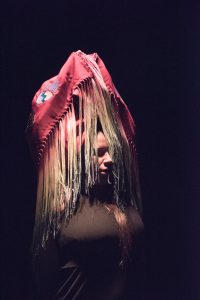
Photo: Chris Randle 2017 Untitled, IndigeDIV, Vancouver
Janna Sailor: This is a question that I ask all of my guests how do you describe yourself as an artist and your creative output? There are so many elements to your work…you are a dancer, a composer, a performer, a producer, a visual artist… Can you delve into that a little bit more and how all of those things work together? It has been amazing also to watch you evolve, even in just the past few years that I’ve known, you’ve just such created such an incredible explosion of creativity and meaningful work.
Jessica McMann: It’s good to hear it described like that. I just I feel like I’m in my bubble and I’m just creating, and it’s cool to hear it sound like that. Okay, who am I as an artist? You know I read an interview with Hubert Laws who said, “I’m a musician”. I am not bound by jazz, classical, I’m a musician, I’m a flutist. And so that completely shifted how I view myself as well. Because I’m so often asked what elements are classical? What elements are Indigenous? And where does your jazz training come in? And can you play, say this jazz chart? I’m like, yes, I can, but I’m not solely doing that. There’s value in artists who do that, and I, I appreciate and value artists who are solely in one genre, but I can’t keep myself in that, especially as a composer and the work that I’m doing it’s slotted into the classical pocket because of my training, I think. And then of course, I did play a lot of the standard repertoire that a flutist does, but as a music creator and with my new projects I don’t want to limit myself to being in that classical or jazz mindset because it is very limiting….and I’m sure there’s jazz players that will argue with me on that! But then you’re you’re in that space, right? And there’s an expectation of what you should sound like, and I don’t want those expectations. But I find that if I go into this process thinking like that, I may be limiting myself from what I actually want to create, and so this new project, I’m taking a lot of time with it. There has to be a way to make everything fit without thinking of categories, we need categories for awards, so who knows where I’ll land with this one, but I feel a lot more free and less held back by it has to be classical in this way, it has to be written down, sound a certain way, etc. I’m looking forward to what I can create without having to think about where I might land in an award system.
Janna Sailor: We as artists need that freedom to express whatever the art requires.
Jessica McMann: Yes, this will be my first time doing that.
New Projects and Future Directions
Janna Sailor: So tell me about this new project that you’ve hinted at it now. I’m dying to know!
Jessica McMann: so I’ve been working on this for maybe about three years. I’ve had a lot of support from my husband, saying “do your own music!” And so Prairie Dusk came from that and from my producer always being like, “do your own music”. So on this new project I play a lot with loop pedals and electronic flute – there was no space for that in Prairie Desk, and so I want to look at recording more of those songs that I perform in my live solo show. Bringing those in, maybe reworking them, maybe making them different or adding elements. Really spending time with that…And maybe it is written out on a score, or maybe not… It’s going to take a few years. My first two albums were so rushed and so jam packed, and I got a grant and I had to get it done, but now I’m lucky that I’m in a place where I can work on it slowly, and I know things that should be in there now…Also, I’m an independent, I don’t have a label, I don’t have an agent. So also learning that other side of things to do it properly so that it gets that forward push… it’s a whole new world.
Janna Sailor: The things we learn as we go through the music biz! And also, it’s such a challenge to allow ourselves that time and space to evolve and grow as artists to be truly authentic…and not confine ourselves to these containers of categories in order to earn the awards and the recognition that you need to get the recognition while still remaining true to your artistic voice and what is needed artistically… it’s constant balancing act….And I’ll say for myself that music is truly a lifelong apprenticeship.
Jessica McMann: Yeah.. It never ends. And you’re never there. You never “get there”, whatever there is. There’s always something else. Janna Sailor: But that’s really inspiring to, to hear this evolution and I always say good things take time to cook. and the best things are still ahead for you.
Jessica McMann: Now I can spend the time cooking and not putting it in one of those Insta Pot pressure cookers!
Weaving Sounds: Indigenous Representation in Music Education
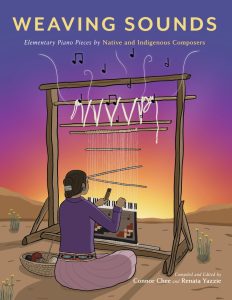
Janna Sailor: I wanted to touch on one other project that I was really excited to see that you are a part of, and that is Weaving Sounds, which is this piano book for students that is a compilation of works of Indigenous composers from across Turtle Island, and you are one of those. It’s a beautiful book, tell me more about that project and how that came about.
Jessica McMann: So Connor Chi and Renata Yazzie are two Navajo pianists and educators and composers in the States that started this project, and there was a huge need for something like this… like you can open up any celebrations book and you’ll see little pieces like Drum Song or Dream Catcher, written by non Indigenous composers and appropriating the cultures, so this was the inspiration for this project…And so to be able to have this is huge. I grew up with like, Land of the Silver Birch and…those are the representations in music that we have (as Indigenous people). But from the beginning when you’re first learning and you get to open up this beautiful book with this beautiful cover and you get to see our faces and you get to hear the story and you learn about where we’re from, and then you play pieces that aren’t like “war drum” inspired music but it already starts to frame the story for those young piano players…They’re not gonna open it up and see Pocahontas and the Savages song. They’re gonna open it up and they’re gonna see individual cultures that are so different and they’re gonna play music that is totally different than what they would expect.
Janna Sailor: And it’s directly from the source.
Jessica McMann: Yes. So I think it’s pretty cool. Like I was really happy to be a part of it. I had some problems or struggles with pedagogy writing, it’s not my strength. People who write for learners specifically are amazing people. And I had so many edits back and forth with Connor as the piece I originally wrote was way too high level, but I didn’t know, like I think I can’t play piano at all, so I chunked it out and it sounded fine! But it was too hard! I’m glad to be part of that project. It’s interesting to see how people are reacting to it and I really hope every piano teacher goes out and gets a copy, because it’s really important to have that in your library.
Janna Sailor: Absolutely. I assume you started your training really young and, what would it have meant to you to see and hear music written by Indigenous composers as you were growing up rather than this appropriated or interpreted versions of what Indigenous music was? What do you think that would’ve done for you and what do you hope that will do for Indigenous students now?
Jessica McMann: I think as a flute player, it would’ve been really important. , I would’ve had more connection to the music. Not that I didn’t have connection to Bach and everything else, which I still do. But it would’ve been different. I think in university it was way more important because I was seeking out those pieces at that level of learning and there was nothing available. Things were hard. But then when I came back to school, I did a research project to build a recital, which I never got to do, but one of the pieces was by Jarod Tate, and his music is incredible. And incredibly difficult. His concerto is like 40 minutes long and it’s got so much extended techniques and it’s just, it’s difficult. Everybody should listen to his music. It’s brilliant. But that was one just one piece… I couldn’t find anything else… It was like, okay, now I have to commission things.
Commissioning New Works
Jessica McMann: I graduated, I went to the Banff centre, and I was getting some more, momentum behind my career. And so in 2020 I started commissioning with Beverly McKiver, she wrote a piece for me, Metamorphosis, which is on my first album. And then we commissioned a piece from Sonny Ray Day Rider, the Blood Night Song No. 1, and the Frog Chorus for alto flute. Then we commissioned another piece from him and that is the Blood Sonata. Then we were on a roll and then, so we then commissioned Jarod Tate for a very short piece, was all we could afford, but he sent us a 20 minute four Movement Suite called Love Songs and they are amazing, and so we’re working on that. We’re rehearsing that right now and we’re hoping to have a premier performance. It is very exciting. It’s very difficult music, but it’s so pretty. The premise of our commission project was that we want to create more repertoire for the flute by Indigenous composers. Around this time I also started writing music. I was supported by Calgary Arts Development to write Stories of my People, which was the suite for flute, alto flute, and piano. And so now there’s more music coming out . And I’m looking forward to continuing that commissioning project.
Jessica McMann: We’re planning on commissioning Cris Derksen and Ian Cusson, to build up the flute repertoire that (currently) doesn’t exist, but you know people will want the flute to sound like the Indigenous flute…So stereotypical, but being able to contribute to this growing body of work in a new way is really important.
Supporting Indigenous Flute Students
Jessica McMann: Right now, there are three Indigenous flute students in schools right now in post-secondary doing their flute degrees. Janna Sailor: And they’re all superstars with mad skills from what I’ve heard!
Jessica McMann: Yes! And so being able to send them my pieces to play is huge. You know, I did a master class with one of them and I’m currently writing a piece for them… And being able to give that support… I’m getting emotional. Giving that support to these youth that I never had through school is huge. I see they’re not having the greatest time with their professors… like I’ve been there. And so I’m just so excited and proud of them to be in these institutions. To be in Ottawa, to be in Winnipeg, to be in, in Vancouver, in these institutions, being who they are and still trying to get to play their own music in their recitals is really important.
Janna Sailor: These students are overcoming a lot of obstacles to be there and in the process of reclaiming their music and their identity and making a space for themselves in a very colonial institution and industry…I’m so thrilled that through initiatives and people such as yourself, you are creating this space and adding to this canon incredibly important works that need to be performed… this is so vital to moving classical music forward, and also to who we are as a community of creators…there’s no room for exclusion in creativity…that’s something that’s personally so meaningful for me to see.
Reclaiming Her Name
Janna Sailor: As you’re evolving as an artist, you’re also evolving personally. You’re reclaiming your birth name, and if you don’t mind telling us a bit more about that, the process and what that means to you.
Jessica McMann: I’m a sixties scoop survivor and so I was forcibly removed from my family and placed with a non-Indigenous family, and so my complete name changed. So I was born and I existed for two years as Virginia-Sparvier. And then in 1989, my parents changed my name to Jessica Lynn McMann. When I was in grade four, I completely changed my name. I found out it was Virginia and I went as Virginia for a whole year in school. I decided, this is my name and I think everybody was really concerned about me at that time…now I understand the situation more. I’ve met my family, I have a connection with my home community. The Alberta government changes adoptees and residential school survivor’s names for free. I don’t know how long that will last. I want to get that in and bring Virginia-Sparvier back…and move away from the McMann. Jessica is going be my middle name. But, I need to move away from…the experience of my life growing up and things like that.
Janna Sailor: So that is another aspect of this evolution and and growing into who you truly are as a person and an artist… And that’s a beautiful thing. I think sometimes when we go about making these these changes in our lives, it’s uncomfortable for those around us. It’s uncomfortable for us. It’s inconvenient for other people, so we shy away from that. But it’s so important. It’s so important to really claim and reclaim ourselves as we go through life.
Turning Points in the Artistic Journey
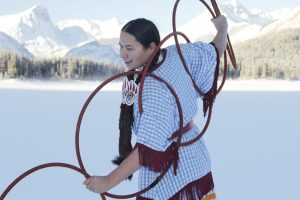
Photo: Tet M Photography
Janna Sailor: As you’ve gone through your career and your life as an artist, have there been really critical turning points or moments of clarity where you’re like – this is what I need to do, or this is the direction I need to go – that defined the next the next phase of your creative life?
Jessica McMann: I feel like there’s three major points. Now that I’m older and I can think back on it, the first one would’ve been I was taking a dance residency in Vancouver with Raven Spirit Dance. And we were in like day four or something, and I’d never done contemporary dance before. And we were in like these weird, difficult floor combinations and I was like, had my hands on the floor and I swing my legs around and I had a moment of – this is what I want to do for the rest of my life! And so after that, I just jumped into it and I went to the Banff Center twice for their Indigenous dance residencies. I took as much training as I could. I was doing really well, then I had a really bad knee injury and I could barely walk and I couldn’t dance. And I was really upset because I was training with somebody who I really respected as a performer and, I fell into this deep depression. Like it was so rough, and so we moved back home and I started doing youth work and things like that, working for boys and girls clubs and YMCA … all those things…and started healing my knee. There was no reason for the injury. And so I started dancing pow wow again, fully started contemporary dancing again. I had dropped out of school at the University of Manitoba because I was told to by my teachers I wasn’t serious enough and so I should just drop out and not do music… and that’s when a huge shift to dance happened. But then, one day I had pulled out my flute and Elijah (my husband) said, “I forgot you played flute,”cause I had packed it away for eight years. I pulled out my flute and it was like, I’m going go back to school. I was working with boys and girls clubs at the time, and it was really hard on my spirit. I had such a hard time with how youth are treated in the system… And so I started practicing. I found a teacher, went back to school, got my music degree. It was no easy thing. And then I went to do my masters. So I graduated, and then it was the pandemic. In 2020, Cris Derksen had messaged me and asked if I wanted to come to Banff for the Indigenous Classical Music Gathering. And I said yes, but I felt really like insecure about the whole thing. But that was the turning point, being in a room, meeting other people, because so often we’re just like, I knew Beverly because we worked together, we met each other at a 60’s scoop art thing we were both doing and we became friends then, but I didn’t know anybody else besides her and Cris – and so to walk into a room and you see all these people (from the Indigenous musical community) – Melody, McKiver, Sonny Ray Day Rider, Corey Payette, Jeremy Dutcher, Andrew Belfour, and Cris Derksen – I didn’t know these people at the time. We had score reading sessions, it was just brilliant, and the support for me in classical music from those people was so incredible… And from that point, I started becoming… I can perform…I can write music (as a result of ) Cris saying, it’s time for you to start composing. Getting those opportunities like that and then being able to work on incredible projects like the Apocrypha Chronicles with ReNaissance Opera, all these things just started building and building. And then going back the second year and then meeting Jonathan (singer on Prairie Dusk) and, these other new incoming people…What Cris built with that program is so incredibly important.
Janna Sailor: You can create in community.
Jessica McMann: Yes. And have people to talk about things with. So if I come upon a weird contract or if I don’t know how to write the tuba part there’s a lot of support that we give each other in this (as a result of) these connections that Cris Derksen has facilitated, Cris should get an award for that work! Cris was the first Indigenous person I met that played a classical instrument…And then I met Rhonda Head, who was the opera singer. So slowly, building and meeting each other, and thanks to the internet getting better too, right? Like it wasn’t a thing back then, but that was the other shift. And then my last shift I think is seeing that dance and music don’t have to be separate, right?… It’s who I am… Blew my whole brain open… And I’m just like, I’m ready to go into this creation mode… They’re not siloed.
Janna Sailor: I remember watching the final presentation of the Indigenous Classical Music gathering that was live streamed from Banff during Covid and being like, this is something profound. This is something incredible. This is going to be a game changer for our industry. This is something that’s so important that everybody needs to see and hear and experience. And I love that. Indigenous artists are claiming the stage and it’s incredible music that is truly, human..and so incredibly moving and does what I believe music can do.
Jessica McMann: And look at the Junos. The first one of the night went to Elisapie…Then it was Snotty Nose Res Kids with with Best Rap album. And then it was Deantha Edmunds with Best Classical Composition. Like there it is. Not that the Junos are necessarily representative of a whole bunch of things, but still to see that happen and to normalize it…it’s starting to happen.
Upcoming Performances and Final Thoughts
Janna Sailor: Tell us about your upcoming tour that’s happening, and kicking off in Calgary May 13th…this is a rare opportunity to hear you in Calgary!
Jessica McMann: Yes. It’s a rare thing for me to perform here…It will be a intimate version of Prairie Dusk. It’ll be myself, Connor Chi and Holly Battacharya, and there will be some new music in there, but it will be focused around the stories of Prairie Desk.
Janna Sailor: Thank you so much for being my guest, it’s just been such a pleasure, and we look forward to experiencing more of your output and your new albums in the months ahead!
For more information on upcoming tour dates, visit HERE.
To listen to the full conversation, visit MUSING.

